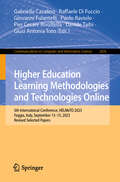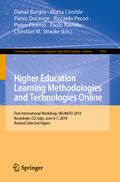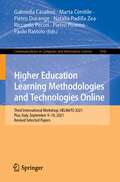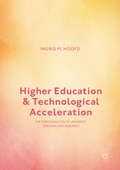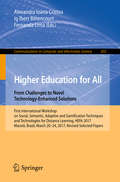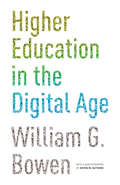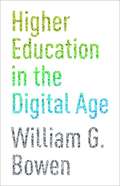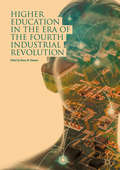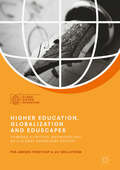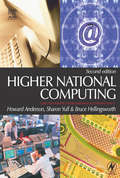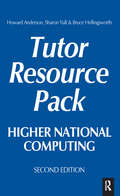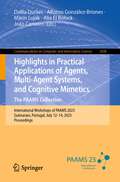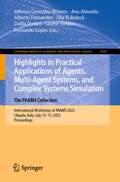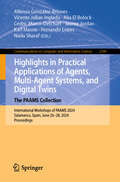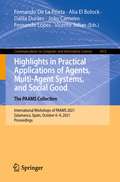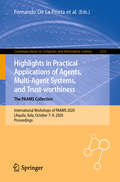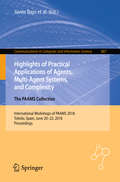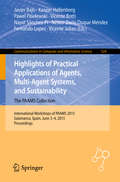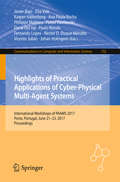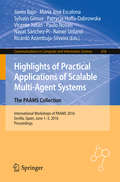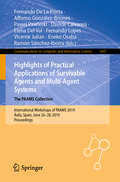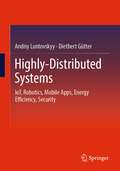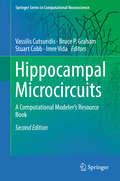- Table View
- List View
Higher Education Learning Methodologies and Technologies Online: 5th International Conference, HELMeTO 2023, Foggia, Italy, September 13–15, 2023, Revised Selected Papers (Communications in Computer and Information Science #2076)
by Paolo Raviolo Davide Taibi Gabriella Casalino Raffaele Di Fuccio Giusi Antonia Toto Giovanni Fulantelli Pier Cesare RivoltellaThis volume constitutes the refereed proceedings of the 5th International Workshop, HELMeTO 2023, held in Foggia, Italy, during September 13–15, 2023. The 52 full papers were carefully reviewed and selected from 107 submission. They are categorized in the following sections: Online pedagogy and learning methodologies and Learning technologies data analytics and educational big data mining and their applications, Smart Systems for Context-aware Education, Emotions and Art in Higher Distance Education and Performing art based methodology to improve online learning experiences, E learning for providing augmented mathematics education at University level, SuperCyberKids the importance of promoting Cybersecurity Education among teacher education students, Effects of High performance Artificial Intelligence systems and Immersive Technologies in Education, The Future of Learning Exploring the Intersection of Posthumanism E Health Technologies and Artificial Intelligence in Education Innovations, Technology based learning interventions in higher education for combating inequalities and increasing the psychological well being of youngsters, Innovative Inclusive University, Beyond borders: exploring immersive environments and new didactic approaches in higher education, Learning Technologies and Faculty Development in the digital framework.
Higher Education Learning Methodologies and Technologies Online: First International Workshop, HELMeTO 2019, Novedrate, CO, Italy, June 6-7, 2019, Revised Selected Papers (Communications in Computer and Information Science #1091)
by Daniel Burgos Riccardo Pecori Marta Cimitile Pietro Ducange Pietro Picerno Paolo Raviolo Christian M. StrackeThis book constitutes the thoroughly refereed post-conference proceedings of the First International Workshop on Higher Education Learning Methodologies and Technologies Online, HELMeTO 2019, held in Novedrate, Italy, in June 2019. The 15 revised full papers and 2 short papers presented were carefully reviewed and selected from a total of 39 submissions. The papers are organized in topical sections on online pedagogy and learning methodologies; learning technologies, data analytics and educational big data mining as well as their applications; the challenge of online sport and exercise sciences university programs.
Higher Education Learning Methodologies and Technologies Online: Third International Workshop, HELMeTO 2021, Pisa, Italy, September 9–10, 2021, Revised Selected Papers (Communications in Computer and Information Science #1542)
by Riccardo Pecori Marta Cimitile Pietro Ducange Pietro Picerno Paolo Raviolo Gabriella Casalino Natalia Padilla ZeaThis book constitutes the thoroughly refereed post-conference proceedings of the Third International Workshop on Higher Education Learning Methodologies and Technologies Online, HELMeTO 2021, held in Pisa, Italy, in September 2021. Due to the COVID-19 pandemic the conference was held online. The 26 revised full papers and 3 short papers presented were carefully reviewed and selected from a total of 65 submissions. The papers present recent research on challenges of implementing emerging technology solution for online, online learning pedagogical frameworks, facing COVID19 emergency in higher education teaching and learning, online learning technologies in practice, online learning strategies and resources, etc.
Higher Education and Technological Acceleration: The Disintegration of University Teaching and Research
by Ingrid M. HoofdThis book critically examines the relationship between new media technologies, research ethics, and pedagogical strategies within the contemporary university. It debates whether recent transformations of higher education, rather than an effect of neo-liberalization, are actually an outflow of the technological acceleration of the university's own contradictory ideals around knowledge and democracy. The book sets up this argument by likening the university to a "vision machine" which quest for total scientific and social transparency has recently caved in on itself, negatively affecting staff and student well-being. The book asserts that this situation reveals the essential tension at the heart of the university system, and explores the acceleration of this tension by analyzing a variety of teaching and research advances from Europe and Asia. Examining among other issues the call for creativity and critical thinking in the curriculum, the push for e-learning, and the advent of the digital humanities, this text offers a key analysis of the university's founding ideals and its constitutive relationship to technological acceleration.
Higher Education for All. From Challenges to Novel Technology-Enhanced Solutions: First International Workshop On Social, Semantic, Adaptive And Gamification Techniques And Technologies For Distance Learning, Hefa 2017, Maceió, Brazil, March 20-24, 2017, Revised Selected Papers (Communications In Computer And Information Science #832)
by Alexandra Ioana Cristea Ig Ibert Bittencourt Fernanda LimaThis book constitutes the thoroughly refereed proceedings of the Researcher Links Workshop: Higher Education for All, held in Maceió, Brazil, in March 2017. The 12 full papers presented were carefully reviewed and selected from 31 submissions. The papers deal with a large spectrum of topics, including higher education, technology-enhanced solutions, user modelling, user grouping, gamification, educational games, MOOCs, e-learning, open educational resources, collaborative learning, student modelling, serious games, language analysis.
Higher Education in the Digital Age
by William G. Bowen Kevin M. GuthrieTwo of the most visible and important trends in higher education today are its exploding costs and the rapid expansion of online learning. Could the growth in online courses slow the rising cost of college and help solve the crisis of affordability? In this short and incisive book, William G. Bowen, one of the foremost experts on the intersection of education and economics, explains why, despite his earlier skepticism, he now believes technology has the potential to help rein in costs without negatively affecting student learning. As a former president of Princeton University, an economist, and author of many books on education, including the acclaimed bestseller The Shape of the River, Bowen speaks with unique expertise on the subject. Surveying the dizzying array of new technology-based teaching and learning initiatives, including the highly publicized emergence of "massive open online courses" (MOOCs), Bowen argues that such technologies could transform traditional higher education--allowing it at last to curb rising costs by increasing productivity, while preserving quality and protecting core values. But the challenges, which are organizational and philosophical as much as technological, are daunting. They include providing hard evidence of whether online education is cost-effective in various settings, rethinking the governance and decision-making structures of higher education, and developing customizable technological platforms. Yet, Bowen remains optimistic that the potential payoff is great. Based on the 2012 Tanner Lectures on Human Values, delivered at Stanford University, the book includes responses from Stanford president John Hennessy, Harvard University psychologist Howard Gardner, Columbia University literature professor Andrew Delbanco, and Coursera cofounder Daphne Koller.
Higher Education in the Digital Age
by William G. BowenTwo of the most visible and important trends in higher education today are its exploding costs and the rapid expansion of online learning. Could the growth in online courses slow the rising cost of college and help solve the crisis of affordability? In this short and incisive book, William G. Bowen, one of the foremost experts on the intersection of education and economics, explains why, despite his earlier skepticism, he now believes technology has the potential to help rein in costs without negatively affecting student learning. As a former president of Princeton University, an economist, and author of many books on education, including the acclaimed bestseller The Shape of the River, Bowen speaks with unique expertise on the subject.Surveying the dizzying array of new technology-based teaching and learning initiatives, including the highly publicized emergence of "massive open online courses" (MOOCs), Bowen argues that such technologies could transform traditional higher education--allowing it at last to curb rising costs by increasing productivity, while preserving quality and protecting core values. But the challenges, which are organizational and philosophical as much as technological, are daunting. They include providing hard evidence of whether online education is cost-effective in various settings, rethinking the governance and decision-making structures of higher education, and developing customizable technological platforms. Yet, Bowen remains optimistic that the potential payoff is great.Based on the 2012 Tanner Lectures on Human Values, delivered at Stanford University, the book includes responses from Stanford president John Hennessy, Harvard University psychologist Howard Gardner, Columbia University literature professor Andrew Delbanco, and Coursera cofounder Daphne Koller.
Higher Education in the Era of the Fourth Industrial Revolution
by Nancy W. GleasonThis open access collection examines how higher education responds to the demands of the automation economy and the fourth industrial revolution. Considering significant trends in how people are learning, coupled with the ways in which different higher education institutions and education stakeholders are implementing adaptations, it looks at new programs and technological advances that are changing how and why we teach and learn. The book addresses trends in liberal arts integration of STEM innovations, the changing role of libraries in the digital age, global trends in youth mobility, and the development of lifelong learning programs. This is coupled with case study assessments of the various ways China, Singapore, South Africa and Costa Rica are preparing their populations for significant shifts in labour market demands – shifts that are already underway. Offering examples of new frameworks in which collaboration between government, industry, and higher education institutions can prevent lagging behind in this fast changing environment, this book is a key read for anyone wanting to understand how the world should respond to the radical technological shifts underway on the frontline of higher education.
Higher Education, Globalization and Eduscapes: Towards A Critical Anthropology Of A Global Knowledge Society (Palgrave Studies in Global Higher Education)
by Per-Anders Forstorp Ulf MellströmThis book examines transnational scapes and flows of higher education: arguing that the educational and political vision of a national, regional and global knowledge society needs to be perspectivized beyond its ethnocentric conditions and meanings. Using eduscapes as its most important concept, this book explores the educational landscapes of individual as well as institutional actors; particularly the agential aspects of how global eduscapes are imagined, experienced, negotiated and constructed. In addition, the authors highlight the critical potential of anthropology, using this perspective as a resource for cultural critique where the Western experience and assumed ‘ownership’ of the global knowledge economy will be put into question. This comprehensive book will appeal to students and scholars of educational policy, the sociology of education and the globalization of education.
Higher National Computing
by Howard Anderson Sharon Yull Bruce HellingsworthHigher National Computing 2e is a new edition of this extremely successful course book, updated specifically to cover the compulsory core units of the 2003 BTEC Higher National Computing schemes. Full coverage is given of the four core units for HNC, the two additional core units required at HND, and the Core Specialist Unit 'Quality Systems', common to both certificate and diploma level.Students following the HNC and HND courses will find this book essential reading, as it covers the core material they will be following through the duration of their course. Knowledge-check questions and activities are included throughout, resulting in a clear and straightforward text which encourages independent study.Like the syllabus itself, this book is ideal for students progressing to HNC / HND from GNVQs, as well as A-Level and BTEC National, with content designed to cover the requirements of students following General Computing, Software Engineering and Business IT courses.
Higher National Computing Tutor Resource Pack
by Howard Anderson Sharon Yull Bruce HellingsworthUsed alongside the students' text, Higher National Computing 2nd edition, this pack offers a complete suite of lecturer resource material and photocopiable handouts for the compulsory core units of the new BTEC Higher Nationals in Computing and IT, including the four core units for HNC, the two additional core units required at HND, and the Core Specialist Unit 'Quality Systems', common to both certificate and diploma level.The authors provide all the resources needed by a busy lecturer, as well as a bank of student-centred practical work and revision material, which will enable students to gain the skills, knowledge and understanding they require.Also available as a web download for adopters, this pack will save a course team many hours' work preparing handouts and assignments, and is freely photocopiable within the purchasing institution. The pack includes:* Exercises to support and develop work in the accompanying student text* Planned projects which will enable students to display a wide range of skills and use their own initiative* Assessment materials* Reference material for use as hand-outs* Background on running the new HNC / HND courses* Tutor's notes supporting activities in the students' book and resource pack
Highlights in Practical Applications of Agents, Multi-Agent Systems, and Cognitive Mimetics. The PAAMS Collection: International Workshops of PAAMS 2023, Guimaraes, Portugal, July 12–14, 2023, Proceedings (Communications in Computer and Information Science #1838)
by Dalila Durães Marin Lujak Alfonso González-Briones Alia El Bolock João CarneiroThis book constitutes the refereed proceedings of the International Workshops on Highlights in Practical Applications of Agents, Multi-Agent Systems, and Cognitive Mimetics. The PAAMS Collection, PAAMS 2023, held in Guimaraes, Portugal, during July 12–14, 2023.The 14 full papers included in this book were carefully reviewed and selected from 26 submissions. They were organized in topical sections as follows: provides a unique opportunity to bring multi-disciplinary experts, academics, and practitioners together to exchange their experience in the development of agents and multi-agent systems.
Highlights in Practical Applications of Agents, Multi-Agent Systems, and Complex Systems Simulation. The PAAMS Collection: International Workshops of PAAMS 2022, L'Aquila, Italy, July 13–15, 2022, Proceedings (Communications in Computer and Information Science #1678)
by Fernando Lopes Ana Almeida Dalila Durães Alfonso González-Briones Alia El Bolock Alberto Fernandez Jaume JordánThis book constitutes the proceedings of the workshops co-located with the 20th International Conference on Practical Applications of Agents and Multi-Agent Systems, PAAMS 2022, held in L'Aquila, Italy, in July 2022.The total of 25 full papers presented in this volume were carefully reviewed and selected from 39 submissions.The papers in this volume stem from the following meetings: Workshop on Artificial Intelligence for Industry (AI4Industry); Workshop on Adaptive Smart areaS and Intelligent Agents (ASSIA); Workshop on Character Computing (C2); Workshop on Deep Learning Applications (DeLA); Workshop on Decision Support, Recommendation, and Persuasion in Artificial Intelligence (DeRePAI); Workshop on Multi-agent based Applications for Modern Energy Markets, Smart Grids and Future Power Systems (MASGES).
Highlights in Practical Applications of Agents, Multi-Agent Systems, and Digital Twins: International Workshops of PAAMS 2024, Salamanca, Spain, June 26–28, 2024, Proceedings (Communications in Computer and Information Science #2149)
by Fernando Lopes Alfonso González-Briones Alia El Bolock Karl Mason Vicente Julian Inglada Cedric Marco-Detchart Jaume Jordan Nada SharafThis book constitutes the refereed proceedings of the International Workshops on Practical Applications of Agents and Multi-Agent Systems, PAAMS 2024, held in Salamanca, Spain, during June 26–28, 2024. The 32 full papers presented here were carefully reviewed and selected from 44 submissions. Papers from the following workshops have been included in these proceedings: - Workshop on Adaptive Smart areaS and Intelligent Agents (ASSIA) Workshop on Character Computing (C2) Workshop on Cognitive Assistants and Data Fusion (CogniBlend) Workshop on Decision Support, Recommendation, and Persuasion in Artificial Intelligence (DeRePAI) Workshop on Intelligent Agents in Science and Engineering (IASE) Workshop on Modelling and Simulation of Modern Energy Markets and Future Power Systems (MASES) Workshop on Digital Twinning for training purposes in Industry 4.0 (Twin4Train)
Highlights in Practical Applications of Agents, Multi-Agent Systems, and Social Good. The PAAMS Collection: International Workshops of PAAMS 2021, Salamanca, Spain, October 6–9, 2021, Proceedings (Communications in Computer and Information Science #1472)
by Vicente Julian Fernando Lopes Fernando De La Prieta Dalila Durães Alia El Bolock João CarneiroThis book constitutes the proceedings of the workshops co-located with the 19th International Conference on Practical Applications of Agents and Multi-Agent Systems, PAAMS 2021, held in Salamanca, Spain, in October 2021.The total of 17 full and 9 short papers presented in this volume were carefully selected from 42 submissions.The papers in this volume stem from the following meetings:Workshop on Character Computing (C2); Workshop on Deep Learning Applications (DeLA); Workshop on Decision Support, Recommendation, and Persuasion in Artificial Intelligence (DeRePAI); Workshop on Multi-agent based Applications for Modern Energy Markets, Smart Grids and Future Power Systems (MASGES); Workshop on Smart Cities and Intelligent Agents (SCIA).
Highlights in Practical Applications of Agents, Multi-Agent Systems, and Trust-worthiness. The PAAMS Collection: International Workshops of PAAMS 2020, L'Aquila, Italy, October 7–9, 2020, Proceedings (Communications in Computer and Information Science #1233)
by Vicente Julian Fernando Lopes Philippe Mathieu Elena Del Val Fernando De La Prieta Alia El Bolock Jaime Andrés Rincón Arango Jaume Jordán Prunera João Carneiro Rubén FuentesThis book constitutes the refereed proceedings of the workshops co-located with the 18th International Conference on Practical Applications of Agents and Multi-Agent Systems, PAAMS 2020, held in L’Aquila, Italy, in October 2020. The total of 21 full and 13 short papers presented in this volume were carefully reviewed and selected from 57 submissions. The papers in this volume stem from the following meetings: Workshop on Agent-Based Artificial Markets Computational Economics (ABAM); Workshop on Agents and Edge-AI (AgEdAI); Workshop on Character Computing (C2); Workshop on MAS for Complex Networks and Social Computation (CNSC); Workshop on Decision Support, Recommendation, and Persuasion in Artificial Intelligence (DeRePAI); Workshop on Multi-Agent Systems and Simulation (MAS&S); Workshop on Multi-agent based Applications for Energy Markets, Smart Grids and Sustainable Energy Systems (MASGES); Workshop on Smart Cities and Intelligent Agents (SCIA).
Highlights of Practical Applications of Agents, Multi-Agent Systems, and Complexity: International Workshops of PAAMS 2018, Toledo, Spain, June 20–22, 2018, Proceedings (Communications in Computer and Information Science #887)
by Javier Bajo Sylvain Giroux Patrycja Hoffa-Dąbrowska Vicente Julián Nayat Sánchez-Pi Rainer Unland Ricardo Azambuja Silveira Philippe Mathieu Elena Del Val Juan M. Corchado Elena María Navarro Martínez Eneko Osaba Icedo Alberto Fernández Rubén Fuentes-Fernández Antonio J. M. CastroThis book constitutes the refereed proceedings of the 11 workshops co-located with the 16th International Conference on Practical Applications of Agents and Multi-Agent Systems, PAAMS 2018, held in Toledo, Spain, in June 2018. The 47 full papers presented were carefully reviewed and selected from 72 submissions. The volume presents the papers that have been accepted for the following workshops: Workshop on Agents and Multi-agent Systems for AAL and e-HEALTH; Workshop on Agent based Applications for Air Transport; Workshop on Agent-based Artificial Markets Computational Economics; Workshop on Agent-Based Solutions for Manufacturing and Supply Chain; Workshop on MAS for Complex Networks and Social Computation; Workshop on Intelligent Systems and Context Information Fusion; Workshop on Multi-agent based Applications for Energy Markets, Smart Grids and Sustainable Energy Systems; Workshop on Multiagent System based Learning Environments; Workshop on Smart Cities and Intelligent Agents; Workshop on Swarm Intelligence and Swarm Robotics; Workshop on Multi-Agent Systems and Simulation.
Highlights of Practical Applications of Agents, Multi-Agent Systems, and Sustainability - The PAAMS Collection
by Vicente Botti Javier Bajo Pawel Pawlewski Vicente Julian Nayat Sánchez-Pi Kasper Hallenborg Nestor Darío Duque Méndez Fernando LopesThis book constitutes the refereed proceedings of the workshops which complemented the 13th International Conference on Practical Applications of Agents and Multi-Agent Systems, PAAMS 2015, held in Salamanca, Spain, in June 2015. The 36 revised full papers presented were carefully reviewed and selected from 91 submissions. This volume presents the papers that have been accepted for the following workshops: Workshop on Agents and multi-agent Systems for AAL and e-HEALTH, Workshop on Agent-Based Solutions for Manufacturing and Supply Chain, Workshop on MAS for Complex Networks and Social Computation, Workshop on Intelligent Systems for Context-based Information Fusion, Workshop on Multi-agent based Applications for Smart Grids and Sustainable Energy Systems, Workshop on Multiagent System based Learning Environments, Workshop in Intelligent Human-Agent Societies.
Highlights of Practical Applications of Cyber-Physical Multi-Agent Systems: International Workshops of PAAMS 2017, Porto, Portugal, June 21-23, 2017, Proceedings (Communications in Computer and Information Science #722)
by Javier Bajo, Zita Vale, Kasper Hallenborg, Ana Paula Rocha, Philippe Mathieu, Pawel Pawlewski, Elena Del Val, Paulo Novais, Fernando Lopes, Nestor D. Duque Méndez, Vicente Julián and Johan HolmgrenThis book constitutes the refereed proceedings of the nine workshops co-located with the 15th International Conference on Practical Applications of Agents and Multi-Agent Systems, PAAMS 2017, held in Porto, Portugal, in June 2017.The 41 full papers presented were carefully reviewed and selected from 80 submissions. The volume presents the papers that have been accepted for the following workshops: Workshop on Agent based Applications for Air Transport and Application of Agents to Passenger Transport; Workshop on Agent-based Artificial Markets Computational Economics; Workshop on Agents and Multi-agent Systems for AAL and e-HEALTH; Workshop on Agent-Based Solutions for Manufacturing and Supply Chain; Workshop on MAS for Complex Networks and Social Computation; Workshop on Decision Making in Dynamic Information Environments; Workshop on Multi-agent based Applications for Smart Grids and Sustainable Energy Systems; Workshop on Multiagent System based Learning Environments; Workshop on Smart Cities and Intelligent Agents.
Highlights of Practical Applications of Scalable Multi-Agent Systems. The PAAMS Collection
by Paulo Novais Javier Bajo María José Escalona Sylvain Giroux Patrycja Hoffa-Dąbrowska Vicente Julián Nayat Sánchez-Pi Rainer Unland Ricardo Azambuja-SilveiraThis book constitutes the refereed proceedings of the seven workshops co-located with the 14th International Conference on Practical Applications of Agents and Multi-Agent Systems, PAAMS 2016, held in Sevilla, Spain, in June 2016. The 37 full papers presented were carefully reviewed and selected from 77 submissions. The volume presents the papers that have been accepted for the following workshops: Workshop on Agents and Multi-Agent Systems for AAL and e-Health; Workshop on Agent-Based Solutions for Manufacturing and Supply Chain; Workshop on MAS for Complex Networks and Social Computation; Workshop on Decision Making in Dynamic Information Environments; Workshop on Intelligent Systems for Context-based Information Fusion; Workshop on Multi-Agent based Applications for Smart Grids and Sustainable Energy Systems; Workshop on Multiagent System based Learning Environments.
Highlights of Practical Applications of Survivable Agents and Multi-Agent Systems. The PAAMS Collection: International Workshops of PAAMS 2019, Ávila, Spain, June 26–28, 2019, Proceedings (Communications in Computer and Information Science #1047)
by Vicente Julian Fernando Lopes Eneko Osaba Elena Del Val Fernando De La Prieta Alfonso González-Briones Pawel Pawleski Davide Calvaresi Ramón Sánchez-IborraThis book constitutes the refereed proceedings of the workshops and special session co-located with the 17th International Conference on Practical Applications of Agents and Multi-Agent Systems, PAAMS 2019, held in Ávila, Spain, in June 2019.The total of 26 full and 8 short papers presented in this volume were carefully reviewed and selected from 47 submissions. The book also contains extended abstracts of the doctoral consortium contributions. The papers in this volume stem from the following meetings: Workshop on Agents-Based Solutions for Manufacturing and Supply Chain, AMSC; Second International Workshop on Blockchain Technology for Multi-Agent Systems, BTC4MAS; Workshop on MAS for Complex Networks and Social Computation; CNSC; Workshop on Multi-Agent Based Applications for Energy Markets, Smart Grids and Sustainable Energy Systems, MASGES; Workshop on Smart Cities and Intelligent Agents, SCIA; and Workshop on Swarm Intelligence and Swarm Robotics, SISR; as well as the special session on Software Agents and Virtualization for Internet of Things, SAVIoTS.
Highly-Distributed Systems: IoT, Robotics, Mobile Apps, Energy Efficiency , Security
by Andriy Luntovskyy Dietbert GütterSo, you are reading a book that aims to cover the field of recent innovations in network services and distributed systems. The book’s target audience includes university and technical college students, graduate engineers and teaching staff. If you are someone else, don’t worry, the topics covered may still be of interest to you!
Hip Prosthesis: CAD Modeling, Finite Element Analysis (FEA) and Compressive Load Testing (SpringerBriefs in Applied Sciences and Technology)
by Solehuddin Shuib Najwa Syakirah Hamizan Amir Radzi Ab GhaniThis book highlights the critical challenge of improving the design and performance of hip implants, which are essential for enhancing patient outcomes in hip replacement surgeries. The book focuses on utilizing Finite Element Analysis (FEA) to optimize implant designs, ensuring they can withstand complex mechanical loads and reduce the risk of failure. It is hoped that readers will gain a deeper understanding of the significance of implant design and the role of FEA in predicting and enhancing implant performance, ultimately leading to better, more durable solutions in orthopedic surgeries.
Hiper y el mapa del fin del mundo
by HiperEl mundo está en peligro y solo una persona puede salvarlo: ¡HIPER! HIPER está listo para pasar unos días de vacaciones en una isla paradisíaca junto con sus amigos, pero lo que no se imagina es que le espera el combate más épico para salvar a la humanidad. Un montón de gente de la isla parece haberse vuelto loca y está arrasando con todo y, por si eso fuera poco, Afrogirl y Steyb han desaparecido... ¡sin dejar rastro! La pregunta es: ¿QUÉ hay detrás de todo esto? O, mejor dicho..., ¡¿QUIÉN?! ÚNETE A HIPER Y VIVE SU AVENTURA MÁS ALUCINANTE.
Hippocampal Microcircuits: A Computational Modeler's Resource Book (Springer Series in Computational Neuroscience #5)
by Vassilis Cutsuridis Bruce P. Graham Stuart Cobb Imre VidaThis is the 2nd edition of a very well received and popular book that reflects the current state-of-the-art of the ongoing research avenues concerning the hippocampus and processing units bridging the gap between single cell activity, network activity and global brain function. It aims to provide a methodology to anyone interested in developing microcircuit level models of the hippocampus. <P><P> The book is divided into two thematic areas: (I) Experimental background and (II) Computational analysis. In part I, leading experimental neuroscientists discuss the morphological, physiological and molecular characteristics as well as the connectivity and synaptic properties of the various cell types found in the hippocampus. Behaviour-related ensemble activity patterns of morphologically identified neurons in anesthetized and freely moving animals provide insights on the function of the hippocampal areas. In part II, computational neuroscientists present models of the hippocampal microcircuits at various levels of detail (e.g. single cell level, network level, etc.). Synaptomics and connectomics models of hippocampal structures are initially discussed. Then, network models of memory, rhythm generation and spatial navigation are presented, followed by abstract and biophysical models of synaptic plasticity. Network models of hippocampal implicated disorders (epilepsy and schizophrenia) are then detailed and how their network topologies, connectivities and activities change in these diseases. Finally, two chapters are dedicated to describing simulator environments of single neurons and networks currently used by computational neuroscientists in developing their models and modelling tools to parametrically constrain them. <P><P> This engaging volume is invaluable to experimental and computational neuroscientists, electrical engineers, physicists, mathematicians and others interested in developing microcircuit models of the hippocampus. Graduate level students and trainees in all of these fields can find this book a significant source of information.
